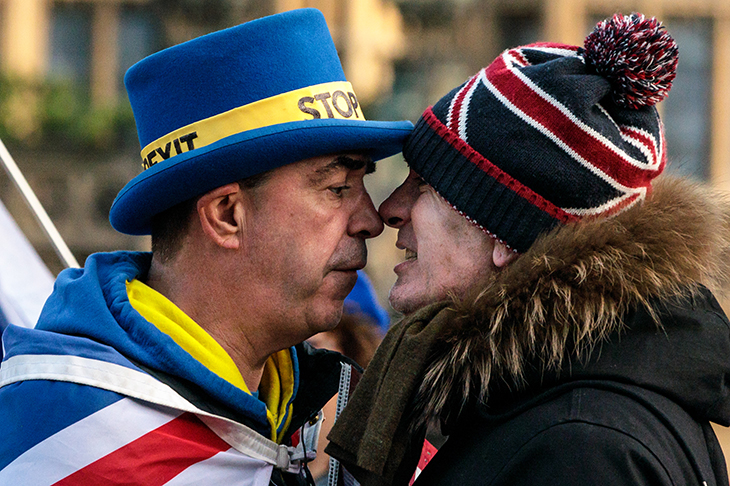Brexit spoilt our social lives for three and a half years. I was in Austria in a house party of 20 Britons when the result came through. Sixteen of us had voted Remain (three while ‘holding their noses’) and four had voted Leave. The Leave voters stayed silent while the rest of us raged about the stupidity of the voting public. One of the party got busy canceling a long-planned canal-boat trip with a lifelong friend who she knew had voted Leave. She suddenly couldn’t face sleeping in close proximity to him.
In London, protest marches were being organized and it was considered very bad form if, as a Remainer, you failed to turn up and be counted. And in Wiltshire one neighbor who already boasted of having two address books to consult when planning dinner parties — one for people who only wanted to talk about horses and one for people who could talk about other topics as well as horses — now had to implement two more sub-categories: Brexit and Remain voters. It had become clear that never the twain could meet amicably.
A celebrated writer and an editor, who had been great friends for 30 years, stopped seeing each other. ‘Sorry but I just couldn’t have anyone in the house who had voted Brexit,’ said the writer. Anyone who had been at Glastonbury and had not got around to organizing a postal vote woke up determined it would never happen again. Brexit-voting boyfriends were axed as ‘fascists’. At every dinner party and in every restaurant, Brexit became the irresistible topic. Even airheads were suddenly ‘informed’ about politics.
As the arguing continued, a Leave-voting friend in Shepherd’s Bush asked me whether it was OK to have forbidden any discussion of Brexit at an upcoming supper that she was hosting for eight old friends. She couldn’t face all the arguing. Her best friend rang her to berate her for having been ‘cruel’, on the grounds that it was the subject tormenting most of them and they needed to air their views.
The trouble was, no one ever changed their minds. Brexit consumed so much energy that many of us simply stopped going to and giving dinner parties. But now there is a definite softening. ‘No one is that bothered any more,’ said my party-loving friend Jo. ‘People are much more interested in talking about coronavirus.’
A fervent Brexiteer neighbor is going to London for a party on Friday night but she feels the celebrations will lack the certainty of, say, winning World War Two. ‘It will be more like the atmosphere of a party celebrating the Northern Ireland peace agreement,’ she says. Everyone seems relieved that we can stop arguing in the short-term, but the general attitude is indifference. And long may it remain so. Cool it on the triumphalism on Friday night.
Because the anger has subsided. It was the uncertainty which made us cross. Now it’s all ‘done and dusted and there’s nothing we can do about it’, as my eyelash technician observed. ‘We can see the light at the end of the tunnel and just go back to getting on with our lives.’
‘Grand women no longer shout at people in restaurants and at parties for voting Brexit,’ an eligible thirty-something bachelor told me. ‘The sommelier at the Connaught told me visitors are spending more on drink.’
Brexit certainly gave many of us an excuse not to go out. But I think the point is this: we can now get back to being friends with old friends. Just don’t mention the war.
This article was originally published in The Spectator’s UK magazine. Subscribe to the US edition here.


























